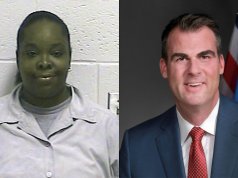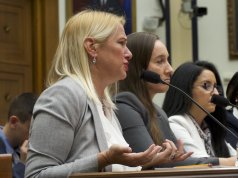
(Editor’s note: This story was authored by Whitney Bryen of Oklahoma Watch and appears here in accordance with the non-profit journalism organization’s republishing terms.)
On a March morning in 2017, Tamera Moore, a 38-year-old woman living in the southeast Oklahoma town of Valliant, began the day with a bitter argument.
She and her boyfriend, Geoffrey Briley, began quarreling and she told him she wanted to break up. He grabbed her neck, threw her onto a bed and began biting her face and lips, court records say. He left, and Moore went to the hospital.
For months, police, prosecutors and even a judge pleaded with her to testify in court. But Moore refused, and prosecutors dropped the charge in June.
Two months later, Moore was found dead – shot in her home. Police arrested Briley at the scene and he faces first-degree murder charges. He pleaded not guilty.
The Moore slaying points to a dilemma that district attorneys in Oklahoma wrestle with on a continuing basis: when a domestic violence victim refuses to cooperate in prosecuting an alleged abuser, should prosecutors pursue the case anyway? Or is it a waste of time or even harmful to the victim to press ahead when the chances of a conviction are diminished?
Moore’s death riled up residents of McCurtain County, with some accusing prosecutors, law enforcement officials and victim advocates of not doing enough to prevent her death.
Officials say the case has become a cautionary tale, and they are more determined than ever to not let an uncooperative victim stop them from pursuing domestic-violence cases using other evidence.
But it’s not easy, and district attorneys have differing views.
Reasons for silence

Oklahoma has many small towns where everyone knows everyone else, which is often a point of pride. But that can also mean domestic abuse victims feel isolated.
They may not report abuse to police or seek help out of fear their story will become public or no one will believe them, prosecutors and advocates say. It’s not uncommon for a family member to work in law enforcement or at the local hospital where a victim would seek treatment for injuries.
District Attorney Chris Boring, who represents Alfalfa, Dewey, Major, Woods and Woodward counties near the panhandle, says there remains a deep stigma around domestic abuse, especially in rural areas. But many small-town jurors still don’t understand why a victim wouldn’t speak up. That makes it difficult to win a trial without the victim’s testimony, even when there are photographs, medical records and witnesses, he said.
The reasons for the silence are multifaceted and complex, says Liz Vaughn, executive director of McCurtain County’s domestic violence shelter.
Victims of intimate-partner violence are isolated from friends and family, she said. Many don’t have jobs and can’t afford to move. They don’t have a way to support themselves or their children if they leave. They worry no one will believe them and speaking out will only make things worse. They’re afraid for their own life and the lives of their children. What if their kids are taken away? They feel powerless and don’t know where to turn.
Some victims still care for their abuser and don’t want them punished, advocates say.
But police and prosecutors want to hold domestic abusers accountable. Otherwise, the violence can escalate and lead to homicide. And in Oklahoma, the problem is severe. Newly released data shows that in 2018, Oklahoma’s rate of domestic-abuse incidents reached the highest level since 2012; there were 25,864 reported abuses.
Victimless prosecution
In 2007, the state Domestic Violence Fatality Review Board issued a report recommending that district attorneys and police increase “evidence-based” prosecution of abusers when victims won’t cooperate. The District Attorneys Council began training its members on the approach.
Allie Spears Buckholts, a domestic-violence prosecutor who advises Oklahoma’s district attorneys, said the practice has become accepted.
But what is considered sufficient evidence to move forward, and how hard prosecutors are willing to push, varies greatly from one district attorney to another.
Some prosecutors lean heavily on victims, seeking cooperation and evidence. Others tend to dismiss charges or settle for plea deals when victims refuse to testify.
Police training, the attitudes of local residents, access to victim services and judges’ and prosecutors’ caseloads are among the factors that determine whether or not charges are filed.
Pushing the case
District Attorney Mark Matloff and Assistant District Attorney Emily Maxwell Herron take a relatively tough approach to domestic abuse cases in McCurtain, Choctaw and Pushmataha counties. Moore’s death reinforced that practice, they said.
“The red light went on with both the judge and myself and we discussed it,” Matloff said, referring to the March 2017 incident. “When somebody bites, physically bites the face of a woman, that’s a pretty good indication that there is no stopping them.”
Briley has a record of violent crimes, with convictions and protective orders, including on domestic assaults, going back to 2000, court filings show. One incident in 2005 involved Moore, who was pushed to the ground and injured.
Matloff and Maxwell Herron said they did everything they could to convince Moore to help them prosecute Briley, but she refused and even began recanting her story. Maxwell Herron, who prosecutes the district’s domestic violence cases, said there was not enough evidence to win the case without Moore’s testimony.
Matloff said his job is to protect women like Moore, which is why his office presses victims to cooperate and vehemently pursues cases with sufficient evidence even when victims resist.
In initial interviews with victims, Matloff’s office presses them to sign an affidavit to pursue charges. That way if they change their mind later, prosecutors have the right to move forward even if the victim objects. Victims can refuse to testify by ignoring a notice to show up in court, he said.
But there are limits to victimless prosecution. State law prohibits police, advocates or other parties from presenting the victim’s side in court to protect the defendant’s constitutional right to face the accuser. There are exceptions for hearsay testimony, but they require proof that the victim is unable to testify because of threats from the defendant.
Pursuing such cases also takes more time and resources, which can be lacking in rural communities. Michael Walden, a detective with the Idabel Police Department, said investigators also can get jaded by being called to the same home many times and may take the case less seriously, resulting in less evidence collected, Walden said.
Some prosecutors and advocates say pushing ahead without the victim can leave victims feeling powerless and frustrated and discourage them from reporting future abuse.
But Matloff stands by his approach.
“I am sensitive to them (victims), but at the same time I know what the end result is and I’m not going to have blood on my hands,” Matloff said.
Deferring to victims
In a neighboring district that includes LeFlore and Latimer counties, District Attorney Jeff Smith tries to accommodate victims.
Smith said he prefers to take direction from domestic violence victims because they know what’s best for them.
“I want to give the victim some type of power, some type of say-so in what happens to them,” Smith said. “And I’ve told them … ‘Listen, I’ll go to the wall with you on this if you want to. I’ll go as far as you want to go or I won’t, so you get to say.’”
But Smith said he doesn’t drop charges for every uncooperative victim. He typically avoids putting them on the stand, but often proceeds if the abuser is a repeat offender and there is enough evidence for a likely conviction. Smith said his office pursues about one-third of cases involving uncooperative victims.
Many of Smith’s domestic cases end in plea deals that include a deferred sentence with required addiction treatment or counseling.
Some district attorneys say it’s important to listen to victims’ concerns, but giving them too much control can put them in a stressful dilemma and can mean fewer consequences for abusers.
Spears Buckholts said prosecutors are trained in these cases and should ultimately decide how to proceed, considering the legal options, victims’ safety, the circumstances and the evidence.
‘No perfect solution’
It was after 10 p.m. on Labor Day 2017 when Briley began knocking on doors and windows at Moore’s home and yelling to let him in.
Then Briley kicked in the front door, according to court records. Moore hid in her bedroom with her 10-year-old son and 17-year-old daughter with the lights off. Briley, using his phone for light, allegedly shoved Moore onto the bed and strangled her, then threw her on the floor and strangled her again. Moore’s daughter tried to pull him off.
According to police, Briley pulled out a .45-caliber pistol and fired five shots into the dark room where Moore huddled with her children. Moore died of two gunshot wounds to the torso, according to the medical examiner’s report.
Days later, Matloff charged Briley with first-degree murder and is seeking the death penalty for the first time in more than a decade. A jury trial is set for January.
Matloff said during his 16 years as a prosecutor, the challenge of convincing domestic-abuse victims to testify remains the same.
“Every once in a while, we’ll have a case like this where it gets brought back to the forefront,” Matloff said, adding, “It’s just more polarizing now because people are paying attention.”
Despite criticism from the community, local officials and advocates said it is residents who need to help solve the issue.
Matloff said after months of pleading with Moore to cooperate, there was nothing more he could do. After she didn’t show up to court, the case was dismissed. Vaughn, of the domestic violence shelter, said she didn’t know about the abuse until after Moore’s death.

Prosecutors and advocates say relatives and friends need to offer support instead of ignoring victims. Emotional or financial support can be the tipping point that allows victims to escape an abusive relationship or tell their story in court, Vaughn said.
Matloff calls the problem of uncooperative victims “an epidemic” and said there is no perfect solution. But he plans to forge ahead, even if it means going against victims’ wishes.
“It’s exhausting to fight these fights. You’re not only fighting against the defendant, most times you’re fighting against the victim,” Matloff said. “The families, they don’t understand what it’s like to fight for someone who doesn’t want you to fight for them.”






















